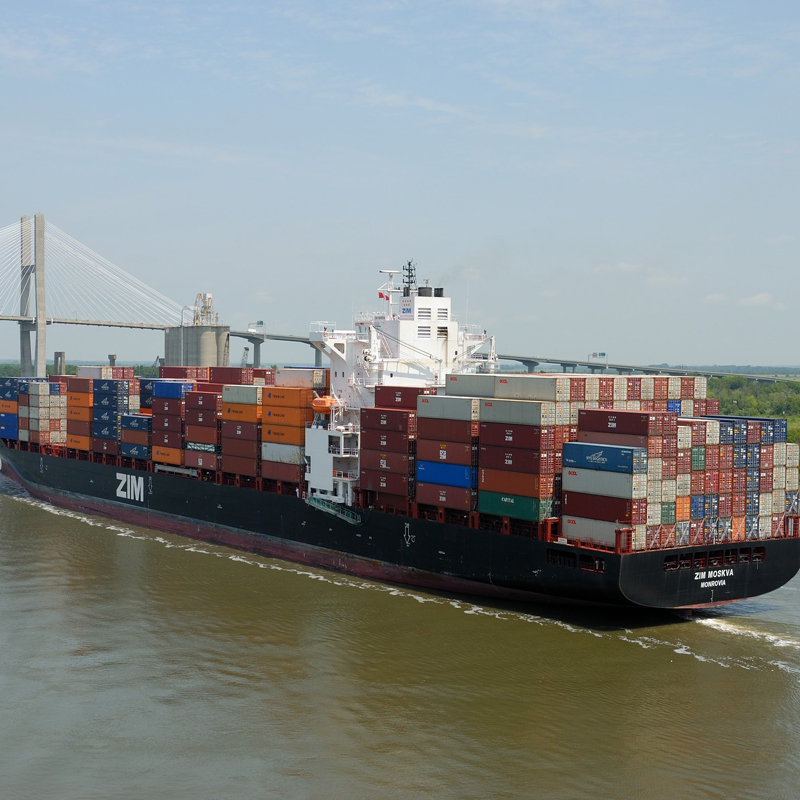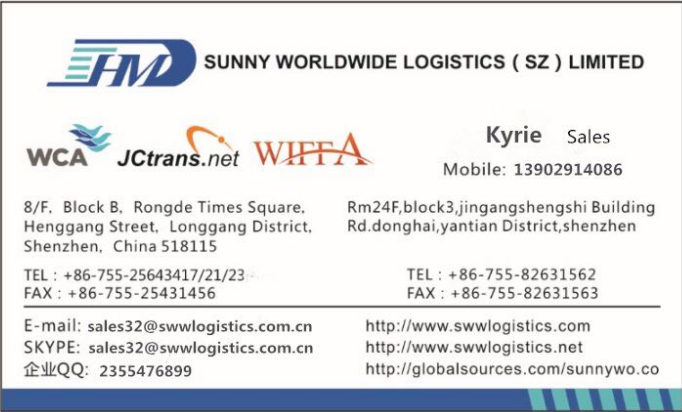Small knowledge of bulk goods, groceries, bulk cargo general terms of carriage
- Author:Kyrie
- Source:The internet
- Release Date:2019-07-24
according toSunny Worldwide logistics Co., Ltd.Edited by the business department:
General shipping terms for bulk goods, groceries, and bulk goods are: LINER TERMS, FIO, FI, FO, FLOST. Here is a detailed introduction to everyone!

1. Liner TERMS: The shipowner is responsible for loading and unloading
The liner term, also known as BERTH TERMS or GROSS TERMS, means that the owner of the ship is responsible for hiring the loader and is responsible for paying for loading and unloading and stacking.
Specifically, at the port of loading, the lessee is only responsible for transporting the goods to the dock, to the side of the ship, and under the hooks of the ship. The owner of the ship receives the goods at the hook and place of the ship at the port of discharge. The person is responsible for delivering the goods under the hook of the ship, and the lessee receives the goods under the hook of the ship. The division of fees is also subject to this.
In the practice of shipping, some people mistakenly believe that as long as the liner provisions are entered into the contract, these kinds of transportation should be carried out in accordance with the conditions of liner shipping, but it is not. The so-called liner clause only emulates the practice of the liner on the sharing of loading and unloading fees, that is, the shipowner bears the loading and unloading costs without involving other rights and obligations.
2, regardless of the loading and unloading FIO: FREE IN AND OUT
The lessor does not bear the loading and unloading fee clause (F.I.O.), also known as the cabin acceptance and delivery terms. Under this clause, the owner of the ship is only responsible for receiving and delivering the goods in the cabin. The loading and unloading workers are hired by the lessee at the loading and unloading port, and the loading and unloading costs are borne.
3, pipe unloading regardless of FI: (FILO) FREE IN LINER OUT shipowner unloading
The lessor does not bear the cost of loading (FREE IN). In fact, we generally use FILO as FREE IN & LINER OUT is commonly known as "pipe unloading"
The lessor does not bear the terms of the loading charge (F.I.), also known as the in-flight receipt clause. Under this clause, the shipowner is only responsible for receiving the goods in the loading port at the loading port. The cost of loading is borne by the bearer, and the costs incurred at the port of unloading are borne by the shipowner.
4, tube loading regardless of FO: (LIFO) LINER IN FREE OUT
This provision, also known as the in-flight delivery clause (FO), in which the owner of the ship pays the loading charge at the port of loading, the owner of the ship at the port of discharge is only responsible for the delivery of the goods, and the unloading fee is paid by the lessee. burden.
5. Regardless of the terms of loading, unloading, stowage and trimming (F.I.O.S.T)
The lessor bears the terms of loading, unloading, stowage and flatage fees, also known as the receipt, delivery and responsibility for the stowage charges. This clause is completely contrary to the terms of the liner. The owner of the vessel is not responsible for all costs associated with loading and unloading. All hiring and loading and unloading workers and related loading and unloading costs are borne by the lessee. Under this clause, the cost of binding the bulky cargo is tied. And the required lashing materials should also be borne by the lessee. However, in order to avoid unnecessary disputes, the words "LASHED" should be specified in the contract when transporting large items to indicate that the owner of the ship is not responsible for the cost of the lashing. Similarly, the addition of the words "DUNNAGES" after the above provisions indicates that the lessor is not responsible for the cost of the mat, except that it is not responsible for the above costs.
The shipowner is not responsible for loading and unloading and cabin management. FLT=FIOST: FREE IN AND OUT, STOWED, TRIMMED is also known as the cabin receipt, delivery and is responsible for the stowage fee terms. The owner of the ship is not responsible for all costs associated with loading and unloading. All hiring and loading and unloading workers and related loading and unloading fees are borne by the lessee.
At present, the domestic bulk cargo and bulk goods market usually uses three types of liner provisions (ie, pipe loading and unloading clauses), F.I.O (regardless of loading, destination port regardless of unloading clause) and F.I.O.S.T (regardless of handling and handling flats).


1. Liner TERMS: The shipowner is responsible for loading and unloading
The liner term, also known as BERTH TERMS or GROSS TERMS, means that the owner of the ship is responsible for hiring the loader and is responsible for paying for loading and unloading and stacking.
Specifically, at the port of loading, the lessee is only responsible for transporting the goods to the dock, to the side of the ship, and under the hooks of the ship. The owner of the ship receives the goods at the hook and place of the ship at the port of discharge. The person is responsible for delivering the goods under the hook of the ship, and the lessee receives the goods under the hook of the ship. The division of fees is also subject to this.
In the practice of shipping, some people mistakenly believe that as long as the liner provisions are entered into the contract, these kinds of transportation should be carried out in accordance with the conditions of liner shipping, but it is not. The so-called liner clause only emulates the practice of the liner on the sharing of loading and unloading fees, that is, the shipowner bears the loading and unloading costs without involving other rights and obligations.
2, regardless of the loading and unloading FIO: FREE IN AND OUT
The lessor does not bear the loading and unloading fee clause (F.I.O.), also known as the cabin acceptance and delivery terms. Under this clause, the owner of the ship is only responsible for receiving and delivering the goods in the cabin. The loading and unloading workers are hired by the lessee at the loading and unloading port, and the loading and unloading costs are borne.
3, pipe unloading regardless of FI: (FILO) FREE IN LINER OUT shipowner unloading
The lessor does not bear the cost of loading (FREE IN). In fact, we generally use FILO as FREE IN & LINER OUT is commonly known as "pipe unloading"
The lessor does not bear the terms of the loading charge (F.I.), also known as the in-flight receipt clause. Under this clause, the shipowner is only responsible for receiving the goods in the loading port at the loading port. The cost of loading is borne by the bearer, and the costs incurred at the port of unloading are borne by the shipowner.
4, tube loading regardless of FO: (LIFO) LINER IN FREE OUT
This provision, also known as the in-flight delivery clause (FO), in which the owner of the ship pays the loading charge at the port of loading, the owner of the ship at the port of discharge is only responsible for the delivery of the goods, and the unloading fee is paid by the lessee. burden.
5. Regardless of the terms of loading, unloading, stowage and trimming (F.I.O.S.T)
The lessor bears the terms of loading, unloading, stowage and flatage fees, also known as the receipt, delivery and responsibility for the stowage charges. This clause is completely contrary to the terms of the liner. The owner of the vessel is not responsible for all costs associated with loading and unloading. All hiring and loading and unloading workers and related loading and unloading costs are borne by the lessee. Under this clause, the cost of binding the bulky cargo is tied. And the required lashing materials should also be borne by the lessee. However, in order to avoid unnecessary disputes, the words "LASHED" should be specified in the contract when transporting large items to indicate that the owner of the ship is not responsible for the cost of the lashing. Similarly, the addition of the words "DUNNAGES" after the above provisions indicates that the lessor is not responsible for the cost of the mat, except that it is not responsible for the above costs.
The shipowner is not responsible for loading and unloading and cabin management. FLT=FIOST: FREE IN AND OUT, STOWED, TRIMMED is also known as the cabin receipt, delivery and is responsible for the stowage fee terms. The owner of the ship is not responsible for all costs associated with loading and unloading. All hiring and loading and unloading workers and related loading and unloading fees are borne by the lessee.
At present, the domestic bulk cargo and bulk goods market usually uses three types of liner provisions (ie, pipe loading and unloading clauses), F.I.O (regardless of loading, destination port regardless of unloading clause) and F.I.O.S.T (regardless of handling and handling flats).

